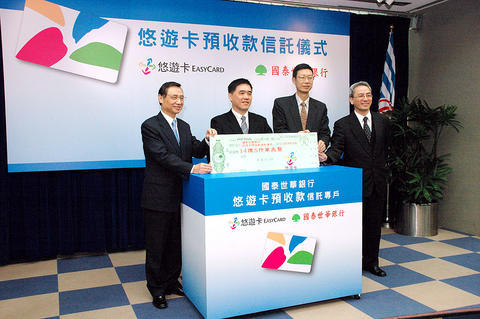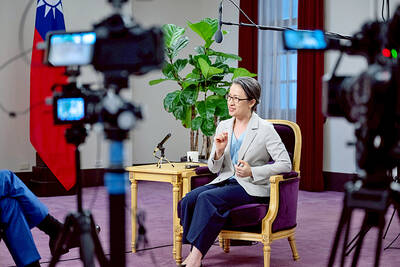In an effort to protect passenger rights, the Taipei Smart Card Corporation (TSCC) yesterday announced it would deposit the more than NT$1.3 billion (US$40 million) it has collected in advance fees from EasyCards into a trust fund.
The multi-purpose EasyCard, used to pay transit fees on Taipei MRT lines and buses, is extremely popular, with 10 million cards in circulation as of last October following its launch on June 12, 2002.
The number of cards is expected to reach 15 million in the near future, the TSCC said.

PHOTO: CNA
Besides the advance fees collected from the EasyCards, the TSCC added about NT$100 million and deposited the money into a Cathay United Bank account.
TSCC general manager Jason Lin (林志盈) said the company added an extra 5 percent to highlight the company's efforts to protect its customers.
"I am very confident about the sale of smart cards, but I think putting the advance fees into the trust fund offers more protection for our customers," he told a press conference yesterday at Taipei City Hall.
Addressing the ceremony, Taipei Mayor Hau Lung-bin (郝龍斌) approved of TSCC's move, and promised to oversee the fund and protect the rights of all cardholders.
"I applaud TSCC's innovative measure and its sincerity. It is not only 100 percent sincere about protecting customers, it is 105 percent," Hau said.
Besides MRT fees and buses, the cards can also be used to pay parking fees and for tickets to Taipei's Maokong gondola system.
The TSCC has already expanded the card's use to Taipei County, Keelung City and Taoyuan County and hopes to keep expanding the use of the card to other areas around the country.

China might accelerate its strategic actions toward Taiwan, the South China Sea and across the first island chain, after the US officially entered a military conflict with Iran, as Beijing would perceive Washington as incapable of fighting a two-front war, a military expert said yesterday. The US’ ongoing conflict with Iran is not merely an act of retaliation or a “delaying tactic,” but a strategic military campaign aimed at dismantling Tehran’s nuclear capabilities and reshaping the regional order in the Middle East, said National Defense University distinguished adjunct lecturer Holmes Liao (廖宏祥), former McDonnell Douglas Aerospace representative in Taiwan. If

TO BE APPEALED: The environment ministry said coal reduction goals had to be reached within two months, which was against the principle of legitimate expectation The Taipei High Administrative Court on Thursday ruled in favor of the Taichung Environmental Protection Bureau in its administrative litigation against the Ministry of Environment for the rescission of a NT$18 million fine (US$609,570) imposed by the bureau on the Taichung Power Plant in 2019 for alleged excess coal power generation. The bureau in November 2019 revised what it said was a “slip of the pen” in the text of the operating permit granted to the plant — which is run by Taiwan Power Co (Taipower) — in October 2017. The permit originally read: “reduce coal use by 40 percent from Jan.

‘SPEY’ REACTION: Beijing said its Eastern Theater Command ‘organized troops to monitor and guard the entire process’ of a Taiwan Strait transit China sent 74 warplanes toward Taiwan between late Thursday and early yesterday, 61 of which crossed the median line in the Taiwan Strait. It was not clear why so many planes were scrambled, said the Ministry of National Defense, which tabulated the flights. The aircraft were sent in two separate tranches, the ministry said. The Ministry of Foreign Affairs on Thursday “confirmed and welcomed” a transit by the British Royal Navy’s HMS Spey, a River-class offshore patrol vessel, through the Taiwan Strait a day earlier. The ship’s transit “once again [reaffirmed the Strait’s] status as international waters,” the foreign ministry said. “Such transits by

Taiwan is doing everything it can to prevent a military conflict with China, including building up asymmetric defense capabilities and fortifying public resilience, Vice President Hsiao Bi-khim (蕭美琴) said in a recent interview. “Everything we are doing is to prevent a conflict from happening, whether it is 2027 or before that or beyond that,” Hsiao told American podcaster Shawn Ryan of the Shawn Ryan Show. She was referring to a timeline cited by several US military and intelligence officials, who said Chinese President Xi Jinping (習近平) had instructed the Chinese People’s Liberation Army to be ready to take military action against Taiwan